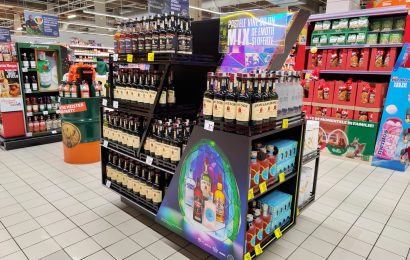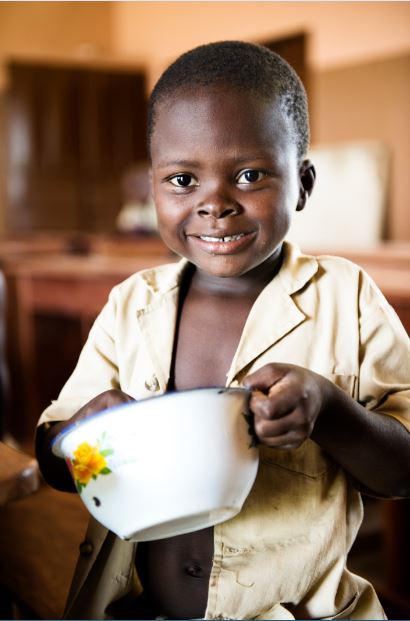Mastercard and the World Food Programme announce 100 million meals commitment
With the mission of creating a world beyond cash and a world beyond hunger, this bold new initiative is Mastercard’s first global commitment with WFP focused on helping reverse the spiral of poverty – supporting four of the United Nations Sustainability Development Goals; No Poverty, Zero Hunger, Quality Education and Gender Equality. As part of the commitment Mastercard and WFP have set an aggressive target of fulfilling as many meals as possible within the next twelve months.
“Mastercard and WFP have already delivered innovative programmes to help build a world beyond hunger and reverse the cycle of poverty. Our 100 Million Meals initiative strives to meet the needs of some of the most deprived and marginalised citizens across the globe,” said Ann Cairns, President, International, Mastercard. “By combining Mastercard’s expertise in technology and payment systems with WFP’s work delivering food assistance around the world, we can leverage innovation to help ensure everyone, everywhere, is included. So far, our journey has already helped provide over 17 million meals, but today we’re stepping up several gears with this ambitious new goal designed to drive greater opportunities and a more inclusive world.”
WFP’s Executive Director, David Beasley, said that over the years of the partnership, Mastercard has helped the organisation change the way it does business, reaching more people with a more efficient and agile approach. “Mastercard’s work toward ending hunger is an inspiring example of how the private sector plays a vital role in social good,” he said. “Their new commitment to 100 million school meals is the next phase of an already very successful journey with WFP to reach Zero Hunger. This contribution to saving lives, changing lives and feeding dreams for kids is truly priceless.”
The initiative, which will provide support equivalent to 100 million meals, will be met by boosting the existing collaboration with WFP, focusing on two clear areas; leveraging expertise and giving campaigns.
Leveraging expertise
- Digital food: in communities where food markets are stable but people are vulnerable and require food assistance, WFP is increasingly using cash and vouchers instead of traditional food distribution, which can save time and money and also support local economies In 2012, Mastercard helped WFP set up a pioneering system to provide prepaid cards for Syrian refugees in Lebanon and Jordan. Since that time, 2.2 million Syrian refugees have used these cards to purchase food in local stores, empowering them to choose food for their families.
- Cost benefit of school meals: during 2016, 18 Mastercard employees undertook temporary assignments in WFP country offices. Their analytical expertise optimized research that has shown that every dollar invested in school meals brings an average economic return of US$6 in the form of improved health and education for schoolchildren
Giving campaigns
At the heart of integrated giving is the Priceless Causes donation platform, which facilitates contributions to WFP through card-based micro-donations. This partnership leverages Mastercard’s payment mechanisms to support a humanitarian cause and provides an opportunity to engage Mastercard’s network of partners, including consumers, to drive a community for change.
Making giving part of everyday life, Mastercard and its partners have helped raise funds to provide over 17 million school meals to children around the world. Over 70 cause-related marketing campaigns in 17 countries across Europe have given cardholders the opportunity to come together and make a cumulative difference one transaction at a time. Through 2017 the partnership plans to take best practices from Europe and expand globally.
Highlights include:
- Asia: this year, Mastercard has supported WFP’s flood relief efforts in Sri Lanka to provide food to 75,000 of the most vulnerable people in temporary government shelters. Mastercard has in the past contributed to WFP’s disaster relief efforts in Nepal, following the devastating earthquake in April 2015, and in the Philippines in 2013 and 2014 after Typhoon Haiyan and Typhoon Hagupit struck the country.
- Central Eastern Europe (11 country campaigns): the largest campaign under the partnership has been running since 2015, with Mastercard donating for each card usage throughout 11 countries. To date 7.5 million nutritious school meals have been provided for school children in Rwanda
- UK: the first of its kind in the UK, this campaign saw Mastercard link up with Virgin Money to help raise funds equal to over 250,000 school meals in Mali
- Belgium: in 2016 Mastercard donated 775,000 school meals through a Cross Border usage campaign in collaboration with Buyway Personal Finance
- German supermarkets and restaurants raised €336,000 in May and June 2013, by donating one school meal for every transaction and Facebook “like”








